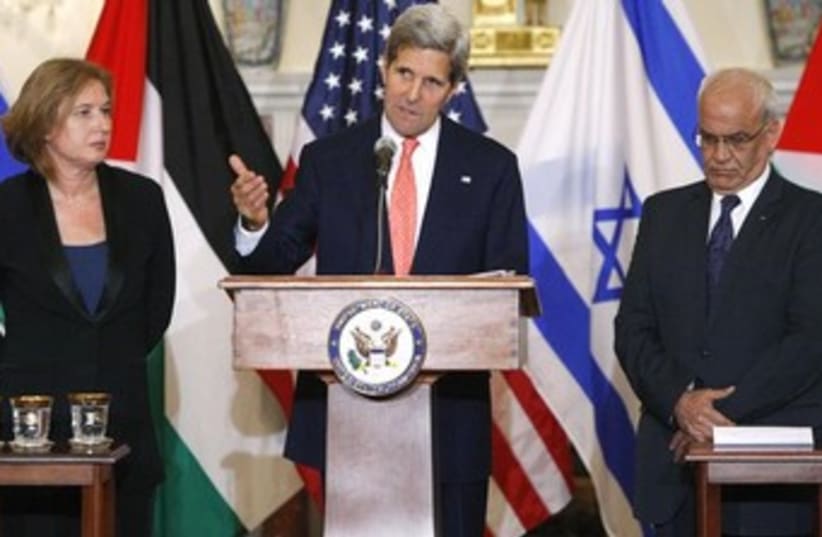WASHINGTON – For six months, US Secretary of State John Kerry has proven largely successful in at least one task: he and his State Department have managed to keep the details of negotiations between Israel and the Palestinians largely under wraps.Private talks have shied away from no single issue, we are told; all historic barriers to a two-state solution have been broached by Israeli and Palestinian leadership.No details have been confirmed by the United States. But theoretically, that should mean Palestinian Authority President Mahmoud Abbas has been challenged to recognize Israel as the Jewish homeland; and that Prime Minister Binyamin Netanyahu has been pushed on the status of Jerusalem, the city he swore never to divide.
On these issues and many others well known to all, there are fervent critics on both sides; and yet because of a dearth of facts available to the public, skeptics have had little to criticize. Only a very small circle of aides can truly speak to whether Netanyahu and Abbas have shifted where they stand.This has been the explicit intent of the State Department. When Martin Indyk was approached for the job of special envoy to the Middle East peace process, Kerry outlined to him one condition: do not, under any circumstances, talk to the press.And yet all of that is about to change upon the announcement of a framework agreement between the two sides, expected by the end of January.Entering the third trimester of a nine-month peace process, we now know the parties have not shifted so dramatically that they are prepared to sign a comprehensive peace treaty. Kerry has thus been forced to improvise. He will, instead, bring together Netanyahu and Abbas around core tenets of a deal – a framework agreement that will provide the basis of a treaty, if not a road map towards one.By making the negotiations a two-step process, the United States has introduced an entirely new reality into a situation already delicate: public opinion, and the politicians who represent the views of those who will invariably hate the details of this framework.Perhaps the framework will be too broad to criticize. But if it proves devoid of detail, the agreement will be toothless, and Kerry, for all his efforts, will lose all the credibility he has earned from his devotion to the cause.Yet the alternative may be more perilous for the secretary of state. Should the agreement address core issues in a meaningful way – and yet include no mechanism pushing the two sides toward action or ultimate enforcement – then the period after the framework’s announcement will be dominated by critics.Indeed, the sacrifices necessary on both sides are so politically perilous, they have forced these negotiations into private for good reason. A public framework threatens to undermine that approach.Instead of requesting courageous action, Kerry is now asking Netanyahu and Abbas to make risky political propositions that are likely to undermine each leader’s governing consensus. For peace to be achieved, he will now rely as much on these two men as on the turbulent Mideast winds of civic discourse.Private peace talks prepare for public debut
US State Department braces for public criticism from all sides upon announcement of Israel-Palestinian framework agreement later this month; Kerry now asking Netanyahu, Abbas to make risky political propositions.
